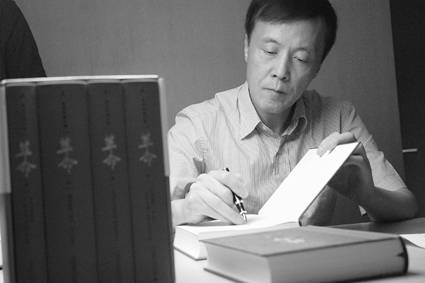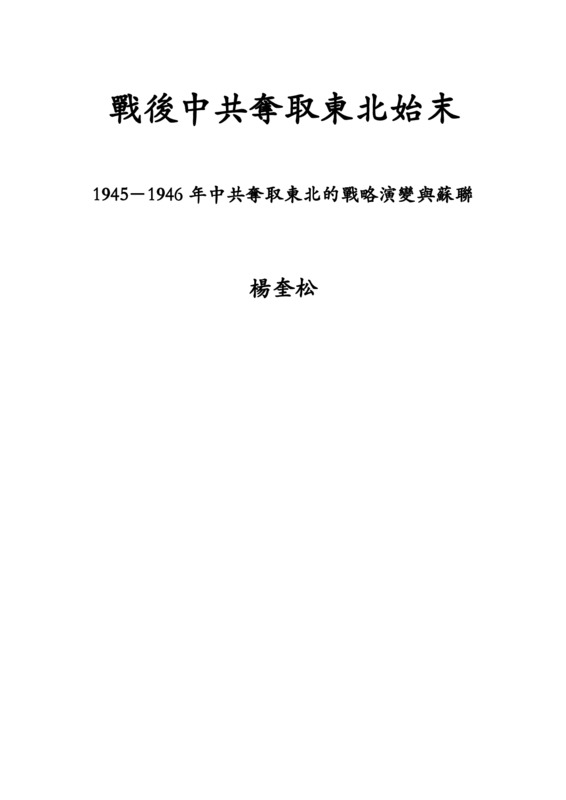Explore the collection
Showing 7 items in the collection
7 items
Book
Collected Papers of Wu Yisan (1)
Writer Wu Yisan is the founder of Hong Kong's May 7 Society, an organization dedicated to the collection, research and publishing of everything related to the anti-rightist campaign in 1957,to restore and present the truth about a period of history characterized by severe persecution of remedial intellectuals. Over the years, Mr. Wu has devoted himself to compiling The Dictionary of Names of 1957 Victims. As the Chief Editor of The Hong Kong May 7 Society Publishing House, he also published The Biography of the Rightists of the May 7.
This book is a collection of his political papers, comprising more than 50 published and unpublished essays primarily written between 2004 and 2009, criticizing CCP from various perspectives, including history, current affairs, and culture.
Book
Collected Papers of Wu Yisan (2)
Writer Wu Yisan is the founder of Hong Kong Five-Seven Society, an organization established in 2007 and dedicated to the collection, research and publishing of everything related to the Anti-Rightist campaign in 1957, to restore and present the truth about a period of history characterized by severe persecution of intellectuals. Over the years, Mr. Wu has devoted himself to compiling *[The Dictionary of Names of 1957 Victims](https://minjian-danganguan.org/collection/1957%E5%B9%B4%E5%8F%97%E9%9A%BE%E8%80%85%E5%A7%93%E5%90%8D%E5%A4%A7%E8%BE%9E%E5%85%B8)*. As the Chief Editor of The Hong Kong Five-Seven Society Publishing House, he also published *The Biographies of the 1957 Rightists* and *[New Biographies of the 1957 Rightists](https://minjian-danganguan.org/collection/%E2%80%9C%E4%BA%94%E4%B8%83%E2%80%9D%E5%8F%B3%E6%B4%BE%E5%88%97%E4%BC%A0%EF%BC%88%E4%B8%8A%EF%BC%89)*.
This book is a collection of Wu’s political essays, including nearly one hundred of his published and unpublished essays and speeches between 1999 and 2017, including historical and current affairs analyses, with an emphasis on commentaries of persecuted intellectuals and political dissidents. These people are often called "traitors of China (han jian)" by CCP, but Wu Yisan argues that the CCP is the real traitor that betrays the country and its people.
Our archive also hosts another anthology of his, *[Is Chen Yi a Good Comrade](https://minjian-danganguan.org/collection/%E6%AD%A6%E5%AE%9C%E4%B8%89%E6%94%BF%E8%AE%BA%E6%96%87%E9%9B%86%EF%BC%881%EF%BC%89)*?
Book
Dictionary of Names of 1957 Victims
An estimated 460,000 to 1.4 million people were persecuted in the Anti-Rightist Campaign (1957-1959). The event was one of the most important political campaigns in the history of the People's Republic because it effectively silenced independent intellectual thought in the Mao era, paving the way for disasters, such as the Great Famine and the Cultural Revolution.
Wu Yisan spent more than ten years researching the lives of this campaign's victims. At 33,000 entries, the list is far from complete but it gives the human perspective on the tragedy in a scope never before attempted. Among the devastating details is the story of Qian Zhongshu, one of 20th century China's best-known writers. Qian's father, Qi Jibo, had been declared a Rightist but died before he could be publicly humiliated. So Qian Zhongshu and his brother-in-law Shi Shenghuai, were forced to attend a mass rally and be criticized in his place. They did so while holding the dead man's "spirit tablet," a piece of wood used in a family shrine with the deceased name, and birth and death dates.
The dictionary was originally published as a CD-Rom. Mr. Wu has made the text version available to the China Unofficial Archive and we are now working to make it a searchable PDF for those who cannot access the CD-Rom version. The Dictionary of Names of 1957 Victims was published by the Humanities Publishing Center and funded by the Laogai Research Foundation.
Article
Facts of the 1958-1962 Disaster in Fengyang County, Anhui Province
The author of this book, Luo Pinghan, is a native of Anhua County, Hunan Province. He graduated from the Party History Department of Renmin University of China and served as director and professor of the Party History Teaching and Research Department of the Party School of the Central Committee of the Communist Party of China. This book was published by Fujian People's Publishing House in 2003.
With Mao Zedong's affirmation, the system of people's communes was rapidly promoted across the country in 1958. At that time, the people's commune was both a production organization and a grassroots political power. Its rise and fanatical development are closely related to the subsequent Great Famine.
As a scholar within the system, the author’s view of history also belongs to orthodox ideology. Although this book is narrated from the official ideology of the CCP, it uses rich and detailed historical materials to comprehensively and systematically introduce the history of the People's Communes, giving it a reference value for a comprehensive understanding of this movement.
Article
Memorandum on "Three Years of Natural Disasters"
The years 1959-1961 were very unusual in the history of disasters in China and the world in the 20th century. Anyone who has experienced it will recall the starvation years and the days when people starved to death everywhere. However, due to official concealment and denial, the number of people who died in this disaster has never been officially announced.
The purpose of Jin Hui's article is to estimate the number of unnatural deaths during the three years of the 1959-1961 disaster in China. Based on public data released by the authoritative National Bureau of Statistics in China Jin concludes that about 40 million people died, which roughly matches studies by foreign scholars, who have estimated up to 45 million.
Article
Yang Kuisong: A Study of New China's "Counter-Revolutionary Suppression" Campaign
How many people were "killed," "imprisoned," and "controlled" in the whole "anti-revolution" campaign? Mao Zedong later said that 700,000 people were killed, 1.2 million were imprisoned, and 1.2 million were put under control. Mao's statement was naturally based on a report made in January 1954 by Xu Zirong, deputy minister of public security. Xu reported at the time that since the anti-revolution campaign, the country had arrested more than 262,000, of which "more than 712,000 counter-revolutionaries were killed, more than 12,900,000 were imprisoned, and 1,200,000 were put under control, and more than 380,000 were released through education because their crimes were not considered serious after their arrest." (3) Taking the figure of 712,000 executed, it already amounts to one and two-fourths thousandths of one percent of the country's 500 million people at that time. This figure is obviously much higher than the one-thousandth of a percent level originally envisioned by Mao Zedong.
Article
Yang Kuisong: The Beginning and End of the CCP's Seizure of the Northeast after the War
The occupation of the Northeast was key to the CCP's success in seizing power in 1949. The author of this book, Yang Kuisong, is a professor and doctoral director of the Department of History at East China Normal University, and a researcher at the Institute of Modern History at the Chinese Academy of Social Sciences. This book describes the CCP's taking of the Northeast as well as the competition between the U.S. and the Soviet Union at that time. After reading it, you will understand: how the Soviet Union played a key role in the CCP's occupation of the Northeast.






